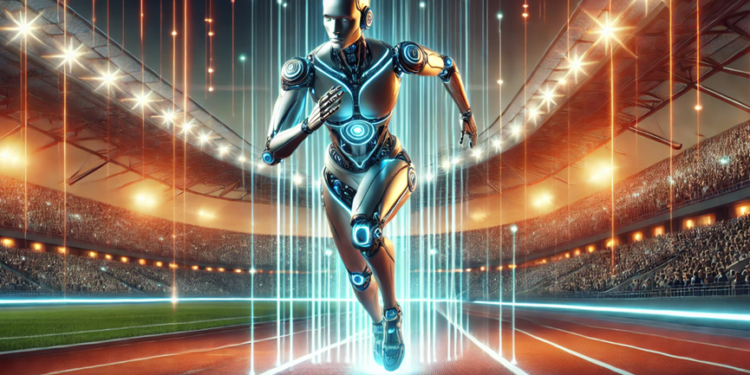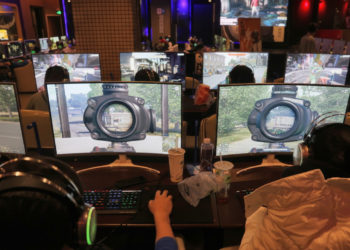Artificial Intelligence (AI) has already transformed numerous industries, from healthcare to entertainment, and now it’s making its mark on the world of sports. With the advancement of AI technology, athletes, coaches, and fans are experiencing sports in new and exciting ways. From enhancing player performance to creating more engaging fan experiences, AI is revolutionizing the way we approach training, competition, and even sports fandom.
In this article, we will explore how AI even is improving sports, both on and off the field.
AI in Sports: A Game-Changer for Performance and Training
When it comes to sports, performance is everything. Whether it’s a soccer player trying to perfect their shot or a basketball player working on their free throws, the difference between good and great often comes down to the smallest details. This is where AI can make a huge impact.
Data Analytics for Performance Improvement
AI systems have the ability to collect and analyze massive amounts of data, something that would be impossible for a coach or athlete to do manually. This is especially useful in performance enhancement, where even the smallest change in technique can make a difference in an athlete’s output.
For example, AI can track an athlete’s movement, heart rate, and muscle strain using wearables, providing real-time feedback on how their body is performing during training or competition. With AI, systems can process vast amounts of data and offer personalized advice on how an athlete can improve their form, stamina, or recovery routine. By continuously learning from these inputs, AI can provide athletes with unique insights and actionable steps to fine-tune their performance.
Simulations and Virtual Training
Another exciting application of AI in sports is the ability to create virtual simulations for training. AI can recreate game scenarios, enabling athletes to practice in lifelike environments without the need for actual opponents or physical setups. For example, tennis players can practice against a virtual opponent who mimics the playing style of various real-life competitors. By engaging with these AI systems, athletes can simulate high-pressure situations, improving their decision-making and reaction times under stressful conditions.
These virtual simulations also make it possible for athletes to train anywhere, anytime, without needing a team or a gym. For remote training, AI-powered AI chatbots can also help athletes stay motivated and on track by offering personalized encouragement and tips based on their current performance levels.
Injury Prevention and Recovery
AI can also play a significant role in injury prevention and recovery. By analyzing an athlete’s movements in real time, AI can detect patterns or flaws that may lead to overuse injuries or poor posture. If a tennis player is favoring one shoulder over the other, for example, an AI system can alert them to this imbalance, potentially preventing rotator cuff injuries down the line.
When it comes to recovery, AI can track progress, suggest rehabilitation exercises, and even adjust the intensity of the workout based on how the athlete’s body is responding. With the help of AI chat, athletes can communicate with virtual coaches or physiotherapists who provide continuous support during their rehabilitation journey.
AI for Team Dynamics and Strategy
In team sports like football, basketball, and soccer, the dynamics between players are just as important as individual performance.

Coaches and analysts use AI to gain deeper insights into team behavior, opposition strategies, and even player interactions during gameplay.
Analyzing Team Strategies
AI can process hundreds of hours of game footage, identifying key moments that could be crucial for future matches. Through video analysis, AI systems break down how opposing teams operate, what their tendencies are, and how best to counteract them. This gives coaches a strategic advantage, helping them plan game strategies with pinpoint accuracy.
AI-powered tools can also evaluate how different players interact on the field. By observing their movements, communication, and teamwork, AI can provide feedback on areas where the team is excelling or where improvements are needed. This can be especially helpful in sports where split-second decisions and team coordination make a huge difference, such as soccer or basketball.
Personalized Player Coaching
Coaches can use AI not just for team strategy but also for individualized player development. AI systems can track how a player responds to specific drills, which tactics improve their overall performance, and which ones are not working as expected. This feedback loop allows coaches to give players more personalized attention without having to spend hours manually analyzing data.
For example, if a soccer player struggles with a particular move or technique, AI systems can suggest tailored exercises or adjustments to help that player improve. Through AI, systems can also engage with players in an interactive chat format, offering suggestions for off-field training, dietary advice, and mental conditioning. These AI-driven virtual coaches serve as a support system for athletes who are looking to take their performance to the next level.
AI and the Fan Experience
Sports fans are the heartbeat of any game. AI is also changing how we interact with sports as fans, making the experience more personalized, interactive, and immersive.
Interactive Fan Engagement
AI is enhancing fan engagement by offering personalized experiences. Through unfiltered AI chat platforms, fans can interact directly with AI-driven virtual personalities of their favorite athletes, teams, or mascots. Imagine chatting with a virtual version of your favorite soccer player, asking them about game strategies, their personal experiences, or their thoughts on upcoming matches. These AI chats can be unfiltered, providing fans with more authentic and personalized interactions that feel less scripted and more real.
Moreover, AI can analyze fan behavior and preferences to provide customized content—whether it’s exclusive interviews, behind-the-scenes footage, or game predictions. This creates a deeper connection between fans and their favorite teams or athletes, as the content is tailored to their individual interests and engagement history.
AI-Enhanced Stadium Experience
AI is also making in-stadium experiences more enjoyable. From smart tickets that automatically adjust to fans’ preferences to AI-driven seating recommendations, stadiums are becoming more streamlined and personalized. Additionally, AI can enhance crowd management by analyzing foot traffic and ensuring fans are directed to their seats, concessions, and bathrooms more efficiently.

For those watching remotely, AI-powered live streams and augmented reality experiences allow fans to feel like they are in the stadium themselves. Virtual reality (VR) and augmented reality (AR) powered by AI are revolutionizing how sports fans experience games, with interactive features that let fans view games from multiple angles or receive real-time stats and updates about players and team strategies.
The Ethical Considerations: Balancing Progress and Fairness
While AI offers a range of benefits for sports, there are ethical concerns to consider, especially when it comes to fairness, privacy, and security. For example, over-reliance on AI-generated performance data could lead to issues around player privacy or even create unfair advantages for certain teams who can afford to invest in cutting-edge technology.
The use of unfiltered AI chatbots in training and fan engagement also raises questions about the limits of artificial interaction. How much should we rely on AI for emotional and psychological support? And when it comes to virtual fan experiences, how do we ensure that they remain genuine and accessible to all fans?
Conclusion
AI’s role in sports is expanding rapidly, offering new ways to enhance training, improve performance, and engage with fans. Whether it’s personalized coaching, advanced data analytics, or virtual fan experiences, AI is making sports more dynamic, engaging, and accessible than ever before.
As we continue to explore the potential of AI, it’s important to maintain a balance between technological advancement and ethical considerations. By doing so, we can ensure that AI continues to enhance the world of sports in ways that are fair, engaging, and inclusive for everyone—athletes, coaches, and fans alike. The future of sports is undoubtedly intertwined with AI, and it’s an exciting time to be part of this evolving landscape.









